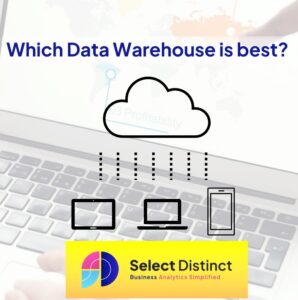There are always a few key factors to consider when deciding which data warehouse is the correct one
We always start with those options that fit best with the technologies and skills you already have in place. Having readily available data is really valuable and helps to simplify implementation and can help build confidence within your teams
Other key factors you will need to think about are Implementation costs and timescales, scalability, whether to have it on premise or in the cloud, compliance requirements and operational costs
Selecting the Correct Database for a Data Warehouse
Selecting the correct database for a data warehouse is an important decision. It can have significant implications for the performance and scalability of your system. A data warehouse is a central repository that allows you to store and analyse large amounts of data from a variety of sources.
There are several different types of databases that can be used as the foundation for a data warehouse, each with its own strengths and weaknesses.
Relational databases:
Relational databases are the most common type of database used for data warehouses. They are based on a structured model that allows you to store data in tables and define relationships between the data. Relational databases are easy to use and support a wide range of queries, making them a popular choice for data warehouses. Examples include SQL Server and Oracle.
NoSQL databases:
NoSQL databases are designed to handle large amounts of unstructured data. They are often used for data warehouses that handle web-based data, such as social media feeds and log files. These databases are typically more flexible and scalable than relational databases, but may be more difficult to use and may not support all types of queries. Examples include MongoDB and Apache HBase.
Column-oriented databases:
Column-oriented databases are optimized for fast query performance and are often used for data warehouses that handle large amounts of data. They store data in columns rather than rows. This makes it faster to retrieve specific columns of data. Examples include Amazon Redshift and PostgreSQL.
Cloud-based databases:
Cloud-based databases are hosted on remote servers and can be accessed over the internet. They can be a cost-effective option for data warehouses, since you only pay for the resources you use. And you don’t need to maintain your own hardware. Examples include Microsoft Azure, Google Big Query.
When selecting a database for your data warehouse, it’s important to consider the size and complexity of your data, the type of queries you will be running, and your budget. It’s also a good idea to test out different databases to see which one performs best for your specific needs.
We can help you choose the best data warehouse for your needs, we are independent to the big vendors and only recommend the solutions that we know will work best for you
If you want to learn the basics about a data warehouse
What is a Data Warehouse
Find Out More


